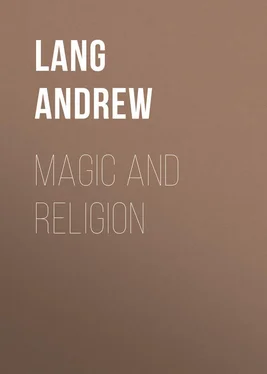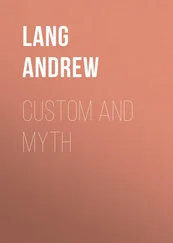Andrew Lang - Magic and Religion
Здесь есть возможность читать онлайн «Andrew Lang - Magic and Religion» — ознакомительный отрывок электронной книги совершенно бесплатно, а после прочтения отрывка купить полную версию. В некоторых случаях можно слушать аудио, скачать через торрент в формате fb2 и присутствует краткое содержание. Жанр: foreign_antique, foreign_prose, на английском языке. Описание произведения, (предисловие) а так же отзывы посетителей доступны на портале библиотеки ЛибКат.
- Название:Magic and Religion
- Автор:
- Жанр:
- Год:неизвестен
- ISBN:нет данных
- Рейтинг книги:4 / 5. Голосов: 1
-
Избранное:Добавить в избранное
- Отзывы:
-
Ваша оценка:
- 80
- 1
- 2
- 3
- 4
- 5
Magic and Religion: краткое содержание, описание и аннотация
Предлагаем к чтению аннотацию, описание, краткое содержание или предисловие (зависит от того, что написал сам автор книги «Magic and Religion»). Если вы не нашли необходимую информацию о книге — напишите в комментариях, мы постараемся отыскать её.
Magic and Religion — читать онлайн ознакомительный отрывок
Ниже представлен текст книги, разбитый по страницам. Система сохранения места последней прочитанной страницы, позволяет с удобством читать онлайн бесплатно книгу «Magic and Religion», без необходимости каждый раз заново искать на чём Вы остановились. Поставьте закладку, и сможете в любой момент перейти на страницу, на которой закончили чтение.
Интервал:
Закладка:
Andrew Lang
Magic and Religion
Recent years have brought rich additions to the materials for the study of early religion, ritual, magic, and myth. In proportion to the abundance of information has been the growth of theory and hypothesis. The first essay in this collection, 'Science and Superstition,' points out the danger of allowing too ingenious and imaginative hypotheses to lead captive our science.
As, like others, I have not long since advanced a provisional theory of my own, the second and third essays are designed to strengthen my position. The theory is that perhaps the earliest traceable form of religion was relatively high, and that it was inevitably lowered in tone during the process of social evolution. Obviously this opinion may be attacked from two sides. It may be said that the loftier religious ideas of the lowest savages are borrowed from Christianity or Islam. This I understand to be the theory of Mr. E. B. Tylor. It is with much diffidence that I venture, at present, to disagree with so eminent and sagacious an authority, while awaiting the publication of Mr. Tylor's Aberdeen Gifford Lectures. My reply to his hypothesis, so far as it has been published by him, will be found in the second essay, 'The Theory of Loan-Gods.' Secondly, my position may be attacked by disabling the evidence for the existence of the higher elements in the religion of low savages. Mr. Frazer, in the second edition of his 'Golden Bough,' has advanced an hypothesis of the origin of religion, wherein the evidence for the higher factors is not taken into account. Probably he may consider the subject in a later work, to which he alludes in his Preface. 'Should I live to complete the works for which I have collected and am collecting materials, I dare to think that they will clear me of any suspicion of treating the early history of religion from a single narrow point of view.' 1 1 Golden Bough , i. xvii, 1900.
Meanwhile, however, Mr. Frazer has advanced a theory of the origin of religion wherein evidence which I think deserving of attention receives no recognition. I hope, therefore, that it is not premature to state the evidence, or some of it, which I do in the third essay, 'Magic and Religion.'
Fourth comes a long criticism of Mr. Frazer's many hypotheses, which are combined into his theory of the origin, or partial origin, of the belief in the divine character of Christ. This argument demands very minute, and, I fear, tedious examination. I fear still more that my labour has not, after all, been sufficiently minute and accurate. It seems to be almost impossible to understand clearly and represent fairly ideas with which one does not agree. If I have failed in these respects it is unconsciously, and I shall gratefully accept criticism enabling me to recognise and correct errors.
Fifthly, I examine, in 'The Ghastly Priest,' Mr. Frazer's theory of the Golden Bough of Virgil as connected with the fugitive slave who was 'King of the Wood' near Aricia. I offer a conjecture as to the origin of his curious position, which seems to me simpler, and not less probable, than Mr. Frazer's hypothesis that this outcast 'lived and died as an incarnation of the supreme Aryan god, whose life was in the mistletoe or golden bough.' But my conjecture is only a guess at a problem which, I think, we have not the means of solving.
There follow an essay, 'South African Religion,' and another on the old puzzle of the 'Cup and Ring' marks on rocks and cists and other objects all over the world.
Next I consider the subject of 'Taboos,' with especial reference to the theory of Mr. F. B. Jevons. An essay follows on the singular rite of the Fire Walk, with the alleged immunity of the performers. This curious topic I have treated before, but now add fresh evidence.
Of these essays the second, in part, appeared in the 'Nineteenth Century,' and most of 'The Ghastly Priest' was published in 'The Fortnightly Review,' while 'Cup and Ring' first saw the light in 'The Contemporary Review.' My thanks are due to the Editors of those periodicals for permission to republish. The essay on the 'Fire Walk' was in the 'Proceedings of the Society for Psychical Research,' though the topic does not appear to be 'psychical.' All the other papers are new, and three Appendices on points of detail are added.
The design on the cover is drawn by Mr. Donnelly, the discoverer of the Dunbuie and Dumbuck sites and relics, from an Australian design, in Messrs. Spencer and Gillen's 'Native Tribes of Central Australia.'
For permission to reproduce this drawing I have to thank the kindness of Messrs. Macmillan & Co. The designs of feet, on the back of the volume (a subject found in Australia), and the 'Jew's harp' ornament (common to Scotland and Hindustan), are also by Mr. Donnelly, from Scottish rock carvings.
I
SCIENCE AND SUPERSTITION
We all know what we mean by science; science is 'organised common sense.' Her aim is the acquisition of reasoned and orderly knowledge. Presented with a collection of verified facts, it is the part of science to reduce them to order, and to account for their existence in accordance with her recognised theory of things. If the facts cannot be fitted into the theory, it must be expanded or altered; for we must admit that, if the facts are verified, there is need for change and expansion in the theory. The 'colligation' of facts demands hypotheses, and these may not, at the moment of their construction, be verifiable. The deflections of a planet from its apparently normal course may be accounted for by the hypothesis of the attraction of another heavenly body not yet discovered. The hypothesis is legitimate, for such bodies are known to exist, and to produce such effects. When the body is discovered, the hypothesis becomes a certainty. On the other hand, the hypothesis that some capricious and conscious agency pushed the planet into deflections would be illegitimate, for the existence of such a freakish agency is not demonstrated. Our hypotheses then must be consistent with our actual knowledge of nature and of human nature, and our conjectured causes must be adequate to the production of the effects. Thus, science gradually acquires and organises new regions of knowledge.
Superstition is a word of much less definite meaning. When we call a man 'superstitious,' we usually mean that evidence which satisfies him does not satisfy us. We see examples daily of the dependence of belief on bias. One man believes a story about cruelties committed by our adversaries; another, disbelieving the tale, credits a narrative about the misconduct of our own party. Probably the evidence in neither case would satisfy the historian, or be accepted by a jury. A man in a tavern tells another how the Boers, retreating from a position, buried their own wounded. 'I don't believe that,' says the other. 'Then you are a pro-Boer.'
The sceptic reasoned from his general knowledge of human nature. The believer reasoned from his own prejudiced and mythopoeic conception of people whom he disliked. If the question had been one of religion the believer might be called superstitious; the sceptic might be called scientific, if he was ready to yield his doubts to the evidence of capable observers of the alleged fact.
Superstition, like science, has her hypotheses, and, like science, she reasons from experience. But her experience is usually fantastic, unreal, or if real capable of explanation by causes other than those alleged by superstition. A man comes in at night, and says he has seen a ghost in white. That is merely his hypothesis; the existence of ghosts in white is not demonstrated. You accompany him to the scene of the experience, and prove to him that he has seen a post, not a ghost. His experience was real, but was misinterpreted by dint of an hypothesis resting on no demonstrated fact of knowledge.
Читать дальшеИнтервал:
Закладка:
Похожие книги на «Magic and Religion»
Представляем Вашему вниманию похожие книги на «Magic and Religion» списком для выбора. Мы отобрали схожую по названию и смыслу литературу в надежде предоставить читателям больше вариантов отыскать новые, интересные, ещё непрочитанные произведения.
Обсуждение, отзывы о книге «Magic and Religion» и просто собственные мнения читателей. Оставьте ваши комментарии, напишите, что Вы думаете о произведении, его смысле или главных героях. Укажите что конкретно понравилось, а что нет, и почему Вы так считаете.












